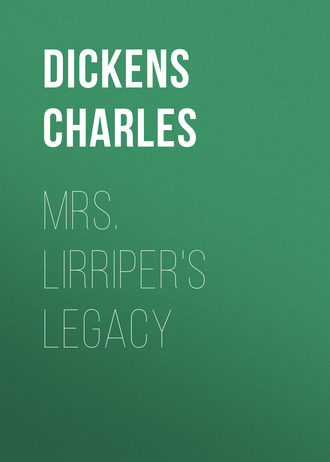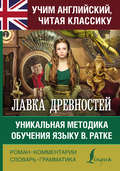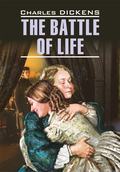
Чарльз Диккенс
Mrs. Lirriper's Legacy
Before going on to look after my Legacy we were to make one regular day in Paris, and I leave you to judge my dear what a day that was with Jemmy and the Major and the telescope and me and the prowling young man at the inn door (but very civil too) that went along with us to show the sights. All along the railway to Paris Jemmy and the Major had been frightening me to death by stooping down on the platforms at stations to inspect the engines underneath their mechanical stomachs, and by creeping in and out I don’t know where all, to find improvements for the United Grand Junction Parlour, but when we got out into the brilliant streets on a bright morning they gave up all their London improvements as a bad job and gave their minds to Paris. Says the prowling young man to me “Will I speak Inglis No?” So I says “If you can young man I shall take it as a favour,” but after half-an-hour of it when I fully believed the man had gone mad and me too I says “Be so good as fall back on your French sir,” knowing that then I shouldn’t have the agonies of trying to understand him, which was a happy release. Not that I lost much more than the rest either, for I generally noticed that when he had described something very long indeed and I says to Jemmy “What does he say Jemmy?” Jemmy says looking with vengeance in his eye “He is so jolly indistinct!” and that when he had described it longer all over again and I says to Jemmy “Well Jemmy what’s it all about?” Jemmy says “He says the building was repaired in seventeen hundred and four, Gran.”
Wherever that prowling young man formed his prowling habits I cannot be expected to know, but the way in which he went round the corner while we had our breakfasts and was there again when we swallowed the last crumb was most marvellous, and just the same at dinner and at night, prowling equally at the theatre and the inn gateway and the shop doors when we bought a trifle or two and everywhere else but troubled with a tendency to spit. And of Paris I can tell you no more my dear than that it’s town and country both in one, and carved stone and long streets of high houses and gardens and fountains and statues and trees and gold, and immensely big soldiers and immensely little soldiers and the pleasantest nurses with the whitest caps a playing at skipping-rope with the bunchiest babies in the flattest caps, and clean table-cloths spread everywhere for dinner and people sitting out of doors smoking and sipping all day long and little plays being acted in the open air for little people and every shop a complete and elegant room, and everybody seeming to play at everything in this world. And as to the sparkling lights my dear after dark, glittering high up and low down and on before and on behind and all round, and the crowd of theatres and the crowd of people and the crowd of all sorts, it’s pure enchantment. And pretty well the only thing that grated on me was that whether you pay your fare at the railway or whether you change your money at a money-dealer’s or whether you take your ticket at the theatre, the lady or gentleman is caged up (I suppose by government) behind the strongest iron bars having more of a Zoological appearance than a free country.
Well to be sure when I did after all get my precious bones to bed that night, and my Young Rogue came in to kiss me and asks “What do you think of this lovely lovely Paris, Gran?” I says “Jemmy I feel as if it was beautiful fireworks being let off in my head.” And very cool and refreshing the pleasant country was next day when we went on to look after my Legacy, and rested me much and did me a deal of good.
So at length and at last my dear we come to Sens, a pretty little town with a great two-towered cathedral and the rooks flying in and out of the loopholes and another tower atop of one of the towers like a sort of a stone pulpit. In which pulpit with the birds skimming below him if you’ll believe me, I saw a speck while I was resting at the inn before dinner which they made signs to me was Jemmy and which really was. I had been a fancying as I sat in the balcony of the hotel that an Angel might light there and call down to the people to be good, but I little thought what Jemmy all unknown to himself was a calling down from that high place to some one in the town.
The pleasantest-situated inn my dear! Right under the two towers, with their shadows a changing upon it all day like a kind of a sundial, and country people driving in and out of the courtyard in carts and hooded cabriolets and such like, and a market outside in front of the cathedral, and all so quaint and like a picter. The Major and me agreed that whatever came of my Legacy this was the place to stay in for our holiday, and we also agreed that our dear boy had best not be checked in his joy that night by the sight of the Englishman if he was still alive, but that we would go together and alone. For you are to understand that the Major not feeling himself quite equal in his wind to the height to which Jemmy had climbed, had come back to me and left him with the Guide.
So after dinner when Jemmy had set off to see the river, the Major went down to the Mairie, and presently came back with a military character in a sword and spurs and a cocked hat and a yellow shoulder-belt and long tags about him that he must have found inconvenient. And the Major says “The Englishman still lies in the same state dearest madam. This gentleman will conduct us to his lodging.” Upon which the military character pulled off his cocked hat to me, and I took notice that he had shaved his forehead in imitation of Napoleon Bonaparte but not like.
We wont out at the courtyard gate and past the great doors of the cathedral and down a narrow High Street where the people were sitting chatting at their shop doors and the children were at play. The military character went in front and he stopped at a pork-shop with a little statue of a pig sitting up, in the window, and a private door that a donkey was looking out of.
When the donkey saw the military character he came slipping out on the pavement to turn round and then clattered along the passage into a back yard. So the coast being clear, the Major and me were conducted up the common stair and into the front room on the second, a bare room with a red tiled floor and the outside lattice blinds pulled close to darken it. As the military character opened the blinds I saw the tower where I had seen Jemmy, darkening as the sun got low, and I turned to the bed by the wall and saw the Englishman.
It was some kind of brain fever he had had, and his hair was all gone, and some wetted folded linen lay upon his head. I looked at him very attentive as he lay there all wasted away with his eyes closed, and I says to the Major —
“I never saw this face before.”
The Major looked at him very attentive too, and he says “I never saw this face before.”
When the Major explained our words to the military character, that gentleman shrugged his shoulders and showed the Major the card on which it was written about the Legacy for me. It had been written with a weak and trembling hand in bed, and I knew no more of the writing than of the face. Neither did the Major.
Though lying there alone, the poor creetur was as well taken care of as could be hoped, and would have been quite unconscious of any one’s sitting by him then. I got the Major to say that we were not going away at present and that I would come back to-morrow and watch a bit by the bedside. But I got him to add – and I shook my head hard to make it stronger – “We agree that we never saw this face before.”
Our boy was greatly surprised when we told him sitting out in the balcony in the starlight, and he ran over some of those stories of former Lodgers, of the Major’s putting down, and asked wasn’t it possible that it might be this lodger or that lodger. It was not possible, and we went to bed.
In the morning just at breakfast-time the military character came jingling round, and said that the doctor thought from the signs he saw there might be some rally before the end. So I says to the Major and Jemmy, “You two boys go and enjoy yourselves, and I’ll take my Prayer Book and go sit by the bed.” So I went, and I sat there some hours, reading a prayer for him poor soul now and then, and it was quite on in the day when he moved his hand.
He had been so still, that the moment he moved I knew of it, and I pulled off my spectacles and laid down my book and rose and looked at him. From moving one hand he began to move both, and then his action was the action of a person groping in the dark. Long after his eyes had opened, there was a film over them and he still felt for his way out into light. But by slow degrees his sight cleared and his hands stopped. He saw the ceiling, he saw the wall, he saw me. As his sight cleared, mine cleared too, and when at last we looked in one another’s faces, I started back, and I cries passionately:
“O you wicked wicked man! Your sin has found you out!”
For I knew him, the moment life looked out of his eyes, to be Mr. Edson, Jemmy’s father who had so cruelly deserted Jemmy’s young unmarried mother who had died in my arms, poor tender creetur, and left Jemmy to me.
“You cruel wicked man! You bad black traitor!”
With the little strength he had, he made an attempt to turn over on his wretched face to hide it. His arm dropped out of the bed and his head with it, and there he lay before me crushed in body and in mind. Surely the miserablest sight under the summer sun!
“O blessed Heaven,” I says a crying, “teach me what to say to this broken mortal! I am a poor sinful creetur, and the Judgment is not mine.”
As I lifted my eyes up to the clear bright sky, I saw the high tower where Jemmy had stood above the birds, seeing that very window; and the last look of that poor pretty young mother when her soul brightened and got free, seemed to shine down from it.
“O man, man, man!” I says, and I went on my knees beside the bed; “if your heart is rent asunder and you are truly penitent for what you did, Our Saviour will have mercy on you yet!”
As I leaned my face against the bed, his feeble hand could just move itself enough to touch me. I hope the touch was penitent. It tried to hold my dress and keep hold, but the fingers were too weak to close.
I lifted him back upon the pillows and I says to him:
“Can you hear me?”
He looked yes.
“Do you know me?”
He looked yes, even yet more plainly.
“I am not here alone. The Major is with me. You recollect the Major?”
Yes. That is to say he made out yes, in the same way as before.
“And even the Major and I are not alone. My grandson – his godson – is with us. Do you hear? My grandson.”
The fingers made another trial to catch my sleeve, but could only creep near it and fall.
“Do you know who my grandson is?”
Yes.
“I pitied and loved his lonely mother. When his mother lay a dying I said to her, ‘My dear, this baby is sent to a childless old woman.’ He has been my pride and joy ever since. I love him as dearly as if he had drunk from my breast. Do you ask to see my grandson before you die?”
Yes.
“Show me, when I leave off speaking, if you correctly understand what I say. He has been kept unacquainted with the story of his birth. He has no knowledge of it. No suspicion of it. If I bring him here to the side of this bed, he will suppose you to be a perfect stranger. It is more than I can do to keep from him the knowledge that there is such wrong and misery in the world; but that it was ever so near him in his innocent cradle I have kept from him, and I do keep from him, and I ever will keep from him, for his mother’s sake, and for his own.”







